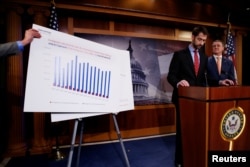The Trump administration has officially ended an Obama-era effort to give the undocumented parents of U.S. citizens and permanent residents temporary reprieve from deportation and allow them to work legally.
A Texas court blocked the 2014 program known as Deferred Action for Parents of Americans and Lawful Permanent Residents (DAPA) before it went into effect, so the U.S. Department of Homeland Security’s announcement late Thursday does not end any protections in place.
The agency said Homeland Security Secretary John Kelly signed a memorandum rescinding DAPA “because there is no credible path forward to litigate" the policy.
But in a move that briefly sowed confusion, the administration simultaneously said it would continue a similar program known as Deferred Action for Childhood Arrivals (DACA), begun in 2012. The program has granted work permits and temporary reprieve from deportation to hundreds of thousands of young adults who came to the country as children without authorization.
Vow to end DACA
As a candidate, Donald Trump vowed to end DACA on his first day in office; later statements took a less dramatic tone. Four months into his tenure, a statement reinforcing that the program remains in place was immediately viewed as reassuring by some analysts, immigrant activists and DACA recipients.
However, on Friday, White House and Homeland Security officials told The New York Times that the parts of the news releases that referred to DACA were only meant to clarify that the program was still in place, not that the administration had made a resolute decision.
“There has been no final determination made about the DACA program, which the president has stressed needs to be handled with compassion and with heart,” said Jonathan Hoffman, the assistant secretary for public affairs at DHS.
A senior White House official said the DAPA decision was to meet a court deadline, and not intended to affect DACA. The official did not know whether the White House was still reviewing DACA but said, "Quite frankly, immigration is something that needs to be resolved by Congress."
Both DACA and DAPA were created at the executive branch level, and are not enshrined in legislation, which made them easier to issue but just as easy — at a technical level — to rescind. Neither policy provided a path to citizenship.
An injunction by a Texas judge in 2015 blocked implementation of DAPA, which would have been open to about 3.6 million people, while the lawsuit was ongoing. The case made it to the Supreme Court, which deadlocked in a 4-4 decision in 2016, leaving in place the lower-court ruling that blocked DAPA.
Hispanic caucus
The Congressional Hispanic Caucus, which hours before the DHS announcement Thursday had requested clarification from the agency on DACA-related policy, on Friday accused the administration of sowing "fear and anxiety" in immigrant communities with its policies.
“Their announcement to keep DACA, while revoking DAPA and deporting family members, is deceitful and is another effort to keep immigrant families feeling uncomfortable about their place in America," CHC's chairwoman. U.S. Representative Michelle Lujan Grisham, a New Mexico Democrat, said in an emailed statement.
The Trump administration has, since January, rolled back many of the previous administration's immigration-related policies.
Though the policy to protect undocumented immigrants who arrived as children had supporters in both political parties, that approval did not extend to DAPA.
Republican Senator Tom Cotton of Arkansas on Friday called it a "deeply irresponsible policy from the start" and a "blatant attempt by the president to circumvent Congress."
"I'm glad to see Secretary Kelly take it off the books," Cotton added.
A crackdown on illegal immigration was a pillar of Trump's presidential campaign. Notably, executive orders issued in January made more undocumented immigrants susceptible to deportation and demanded the hiring of 15,000 border and immigration enforcement agents.
“I think we need to fight like hell to keep DACA around,” said Philip Wolgin, who heads the the immigration division at the Center for American Progress, a progressive research and advocacy organization.
Nearly 800,000 young, undocumented immigrants are covered by the program, and “there is importance in lifting that up, making sure we protect it and continuing to fight,” he said.
“I wouldn’t say this is the end of the road in any way," Wolgin added.






